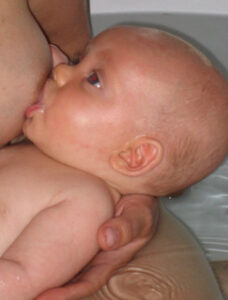Anouk Lloyd
Midwife. Lactation Consultant. Tongue Tie Specialist.
Call me on: 07904208393
email: anouk@privatemidwives.com
Tongue Tie Service
Tongue Tie Assessment and Procedure (frenulotomy) single appointment £240
Tongue Tie Assessment (no procedure) £100 for up to 1 hour appointment.
Includes assessment of feeding (breast or bottle), the function and anatomy of baby’s tongue, lactation support and a telephone follow up. Essential prior to tongue tie procedure.
Tongue Tie Procedure (frenulotomy) £140 for up to 1 hour appointment.
Provided by Anouk. Following tongue tie assessment. Includes tongue tie procedure, feeding support, feeding plan and weight as required and telephone follow up appointment.
NOTE: Tongue tie assessments and procedures may be separate appointments or together. All babies must have a tongue tie assessment by Brighton Breastfeeding team prior to procedure.
What is Tongue Tie?
Tongue tie (ankyloglossia) is a condition affecting up to 1 in 10 babies. It can be hereditary and is more common in boys. A lingual frenulum, the tissue underneath the centre of the tongue, is a normal part of anatomy. However, when this structure is shorter, tighter or attached near the tip of the tongue, this can cause restricted tongue movement and function which can make feeding difficult. Many tongue ties are asymptomatic and cause no problems with feeding.
If babies are breastfeeding or bottle feeding well and there are no problems for the mother or infant, the tongue tie doesn’t need dividing. However, if you are having feeding difficulties or are concerned that your baby may have a tongue tie I can help you. As a skilled and experienced health professional I can provide a thorough feeding assessment, tongue tie assessment and tongue tie division (frenulotomy), if indicated. The National Institute for Clinical Excellence (NICE) says there are no major safety concerns about division of tongue tie.
How I Can Help
In a private clinic in Brighton, or the comfort of your own home I will take a full history, including feeding history and observe a feed to assess your baby’s feeding skills and tongue function. I can weigh your baby and support you with a feeding plan, tailored to your personal situation and feeding goals. Breastfeeding is a learned skill for both mother and infant and takes time to master. How babies lie in the womb, how and when they are born and events in the early days, can all have an impact on how babies take to feeding. Many feeding issues can be resolved with additional lactation support only.
However if your baby has a tongue tie we will discuss the benefits, risks and alternatives to the procedure. If a tongue tie procedure is clinically indicated and you wish to proceed this can be performed at the first appointment, although many families may wish to take a conservative approach and have additional feeding support first.
Some tongue ties are obvious and at the tip of the tongue, whilst others are further back and less obvious, you may have heard them called posterior ties.I will perform a thorough feeding assessment and check for any restrictions in your baby’s tongue function. I will help with whatever issues you are experiencing and help get you on track. I take a holistic approach and can provide the time you both need to reach your personal goals. As a registered health professional I have performed this procedure on many hundreds of babies and also lead a busy NHS service where I practice and teach this skill to other health professionals.
Problems Which May be Due to Tongue Tie
Note: Babies may not display all these symptoms and some of these symptoms may be due to something else. This is why having a skilled Lactation Consultant is essential.
Mother
- Sore/damaged nipples
- Nipples which look misshapen or blanched after feds
- Mastitis
- Low milk supply
- Exhaustion from frequent/constant feeding
- Distress from failing to establish breastfeeding
Baby
- Restricted tongue movement
- Small gape resulting in biting/grinding behaviour
- Unsettled behaviour between feeds
- Weight loss or slow weight gain
- Difficulty staying attached to the breast or bottle
- Frequent or very long feeds
- Colic, wind, hiccoughs
- Reflux (vomiting after feeds)
Tongue Tie Clinic Appointments – What to Expect
Whether you have a home or clinic appointment please ensure your baby is ready for a feed at your allotted time. Please provide your Child Health Record (Red Book) if you have one and a blanket/swaddle for your baby. If you are using bottles or shields please bring those.
I only treat tongue ties on babies who are clinically well, with no medical conditions and who have received Vitamin K (1 injection or 2 oral doses). I do not treat babies who have any family history of bleeding disorders such as Haemophilia (type A and B), Factor VII deficiency, Factor XI deficiency, Von Willebrands Disease and platelet function disorders. If the appointment is in your home, please provide a clean, flat surface with good lighting.
If a tongue tie procedure is clinically indicated and you decide to go ahead, I will discuss the risks, benefits and alternatives to the procedure. This will enable you to make an informed choice and decide whether to go ahead with the procedure or not. Some families choose conservative strategies first. I will help with feeding positions and plans and may suggest a cranial osteopath appointment. There will be no rush to make a decision at the time of the appointment. Further appointments can always be made.
If you decide to have your baby’s tongue tie released I will ask you to sign a consent form first. I will then swaddle your baby, and ask you to gently hold your baby on a clean, flat surface. Using sterile gloves, I lift up your baby’s tongue and using single use, sterile scissors I snip the frenulum. No anaesthetic is used, as this area has poor nerve supply and the procedure is not thought to be particularly painful. However for older infants, an infant dose of Calpol, according to the instructions on the box, may be given prior to or after the procedure if they appear to be sore or more upset than usual.
The procedure is very quick and once it has been performed a small diamond shaped wound may appear underneath your baby’s tongue. There is usually only a very small amount of bleeding and babies usually latch on and feed immediately following the procedure. Most babies only cry for a little bit before feeding and are settled afterwards. I will support you with a feed and then when your baby is finished I will show you some simple exercises and games to help with your baby’s tongue function. I will discuss what to expect in terms of feeding and wound healing. I will usually ask you to take before and after pictures and send these to me.
What to Expect After a Tongue Tie Division
Although the restriction will have been released, infants need to learn how to use their tongue in a new way. Sometimes there is immediate improvements, especially in the very young babies with anterior type tongue ties, however many infants need to develop stamina and feeding skills and this can take time. Sometimes feeding worsens before improvements are seen. You can support your baby with frequent feeding and lots of cuddles, alongside some simple exercises and games. Techniques such as switch feeding and breast compressions might be suggested, in order to help your baby get more milk each feed and stay active whilst breastfeeding.
If you are bottle feeding, ensure all teats, dummies and bottles are sterilised thoroughly and if using formula ensure it is always prepared safely. Occasionally infants may swallow some blood whilst feeding straight after the procedure. If this happens you may notice this in any vomit or stool in the nappy. Occasionally some babies may heal in a way that the wound over granulates. This can look unusual under the tongue but doesn’t seem to effect feeding or bother babies. As the wound remodels over the next couple of months this will gradually disappear.
Tongue tie FAQ’s
Guidance on aftercare and bleeding for parents
Association of Tongue tie Practitioners Information Sheet
UNICEF UK Tongue tie information
National Institute of Clinical Excellence (NICE) Tongue tie guidance

